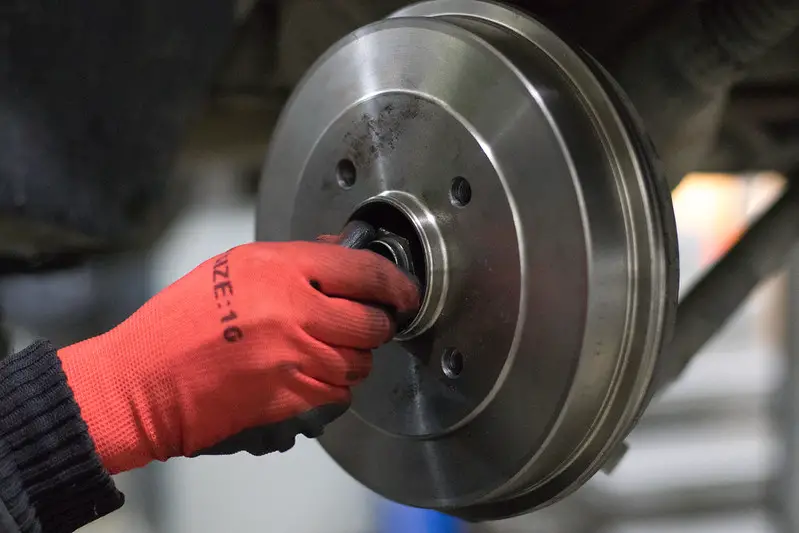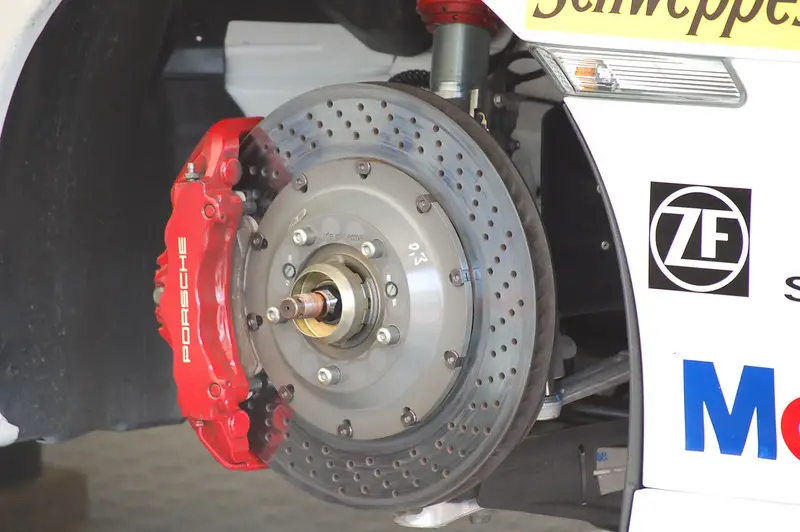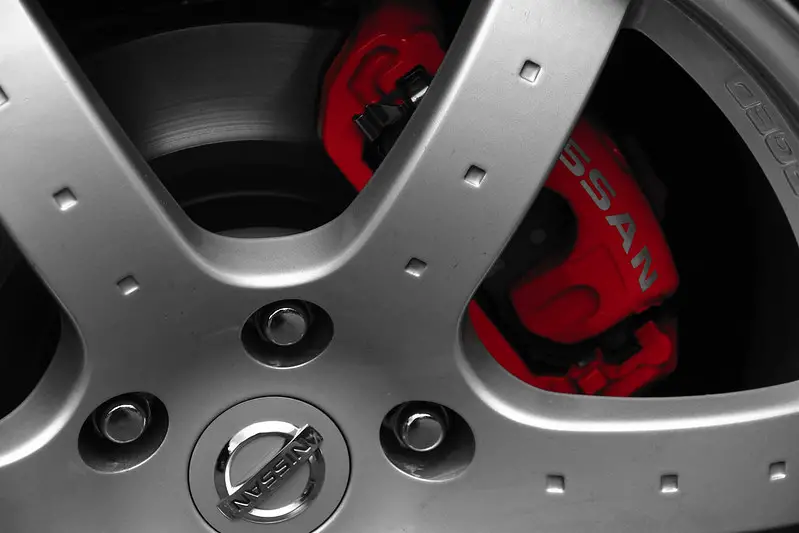Drum brakes are reliable, easy to maintain, and inexpensive. On the other hand, disc brakes provide better stopping power, dissipate heat more effectively, last longer than drum brakes and require less maintenance. If you’re looking for a low-cost option that requires minimal maintenance but still provides adequate braking performance for everyday use then drum brakes may be suitable. However, if you’re after high-performance braking with superior stopping power and durability then disc brake systems are the way to go.
Drum Brakes
(Photo By Ivan Radic on Flickr)

Drum brakes, also known as drum brake systems, have been in use for over a century. They are commonly found on the rear wheels of many vehicles and consist of a circular drum that rotates with the wheel. When you press down on the brake pedal, shoes inside the drum expand and press against it to slow down or stop your vehicle.
One advantage of drum brakes is their simplicity in design and low cost compared to disc brakes. They are also less likely to be affected by water or other debris since they are enclosed within a protective housing.
However, one major disadvantage of drum brakes is their tendency to generate more heat than disc brakes due to friction between the shoes and drums. This can result in reduced braking performance over time, especially during prolonged or heavy use.
Another issue with drum brakes is that they require regular adjustment as the pads wear out over time. If not adjusted properly, this can lead to uneven braking and reduce overall safety while driving.
While drum brake systems may still be used on some vehicles today due to their affordability and simplicity in design, disc brake systems have become more popular due to better stopping power and reliability.
Disc Brakes
(Photo By Kevin Rodriguez Ortiz on flickr)

Disc brakes are a type of braking system that uses friction to slow down or stop the rotation of a wheel. They consist of a metal rotor attached to the wheel, and one or more calipers that contain brake pads. When pressure is applied to the brake pedal, hydraulic fluid flows into the caliper causing it to squeeze against the rotor.
One major advantage of disc brakes over drum brakes is their superior stopping power. This means they can bring vehicles to a stop much faster and with greater precision. Disc brakes also tend to perform better in wet conditions as they are less prone to fading due to overheating.
Another benefit of disc brakes is their ease of maintenance. The design allows for simple pad replacement without needing specialized tools or equipment. In addition, disc brake systems generally last longer than drum brakes before requiring service or replacement.
However, there are some potential downsides with disc brakes as well. They can be more expensive upfront than drum brakes due to their more complex design and materials used for manufacturing them. Additionally, they may produce noise during operation which could be an annoyance for some drivers.
While there are pros and cons associated with both types of braking systems, it’s clear that disc brakes offer several advantages when compared with drum brakes in terms of performance and ease-of-use.
Drum brakes Vs. Disc brakes – Key differences
Drum brakes and disc brakes are two of the most commonly used brake systems in vehicles. Both serve their purpose effectively but have key differences that set them apart.
One significant difference between drum and disc brakes is the way they operate. Drum brakes work by pressing brake shoes against a rotating drum, while disc brakes use calipers to press pads against a rotor. The design of these two braking systems results in different levels of performance and maintenance requirements.
Another notable difference is the heat dissipation capacity of each system. Disc brakes are better at dissipating heat than drum brakes, which means they tend to perform better under high-stress situations like heavy braking or mountain driving.
The size and weight of your vehicle also determine which type of brake system will be suitable for you. Generally, smaller cars benefit more from using front-wheel disc brake systems because they’re lighter than rear-wheel drums found on trucks or SUVs.
One essential consideration when choosing between drum and disc brakes is their cost. While both come with initial costs associated with installation, repairs could vary significantly depending on which system you choose.
It’s crucial to look at all factors when considering whether to go for a drum or disk braking system- including personal preferences, driving style needs as well as mechanical considerations such as how much you can afford over time!
How to know when it’s time to replace your brakes?
Your vehicle’s brakes are essential for your safety and the safety of others on the road. Therefore, it is crucial to know when it’s time to replace your brakes. Here are some signs that indicate brake replacement is necessary.
Firstly, if you hear a loud screeching or grinding noise when applying the brakes, this could be an indicator that the brake pads have worn down significantly. Secondly, if you notice that your vehicle takes longer to stop than usual or feels like it vibrates or pulls to one side while braking, this could also mean that new brake pads are needed.
Another sign of worn-out brakes is a soft pedal. If you feel like you need to press down harder on the brake pedal before your car comes to a stop, then there may be air in the hydraulic system or low levels of brake fluid.
Pay attention to warning lights on your dashboard as they can signal issues with your braking system. If any of these signs occur while driving, don’t hesitate – take action immediately by having them checked by a professional mechanic!
The advantages and disadvantages of Drum Brakes
Drum brakes have been around for a long time and are still used in many vehicles today. One of the advantages of drum brakes is that they are generally less expensive than disc brakes, making them more affordable to replace or repair.
Another advantage of drum brakes is their ability to handle larger variations in temperature. They have a larger surface area which means they can better dissipate heat, reducing the risk of brake fade during extended periods of use.
However, there are also some disadvantages to using drum brakes. One disadvantage is that they tend to be less responsive than disc brakes when it comes to stopping power. This can be especially true in emergency situations where quick stops may be necessary.
Drum brakes also require adjusting periodically as the shoes wear down and the drums expand with heat. This maintenance can add up over time and potentially become costly if not properly maintained.
Replacing worn-out drum brake components can take longer due to their design being more complex compared to disc braking systems.
While drum brakes may offer some advantages like affordability and temperature tolerance, their drawbacks such as reduced responsiveness and higher maintenance requirements should be considered before deciding on whether or not they’re right for your vehicle’s needs.
The advantages and disadvantages of Disc Brakes
Disc brakes have become increasingly popular over the years, mainly due to their higher efficiency in stopping vehicles compared to drum brakes. One major advantage of disc brakes is their ability to dissipate heat more quickly, which results in less brake fade and better performance during long periods of braking.
Another advantage is that disc brakes are generally easier and cheaper to maintain since they tend to last longer than drum brakes. Additionally, disc brakes provide a more consistent braking experience regardless of weather conditions or how hard you press on the pedal.
However, one disadvantage of disc brakes is that they can be noisier than drum brakes when coming to a stop. This squeaking noise may occur even with new brake pads and can be annoying for some drivers.
Another potential disadvantage is that replacing worn-out discs can be expensive as it requires replacing both the rotor and pads. Discs also tend to wear out faster if not maintained properly or if used excessively under extreme driving conditions.
Despite these disadvantages, disc brakes still provide several benefits over drum brakes making them a preferred choice for many vehicle manufacturers and drivers alike.
Can I convert my drum brakes to disc brakes?
Yes, but it requires a few modifications.
Firstly, you need to know if your car has enough space for disc brake components. Disc brakes are larger than drum brakes and require more space to fit properly. If there isn’t enough room in the wheel well, then conversion might not be possible.
Secondly, you’ll need to purchase new parts such as calipers, rotors, pads and brackets. These parts can vary depending on the make and model of your vehicle so research before making any purchases.
Thirdly, installation must be done carefully or by a professional mechanic who knows how to do conversions accurately without causing further damage or problems with other aspects of the car’s performance like ABS sensors which can be affected by this change.
It’s important to keep in mind that converting from drum brakes to disc brakes will increase stopping power significantly but also cost money upfront due mainly because these replacements are expensive compared with replacing only one part as opposed too many when doing an entire conversion at once!








